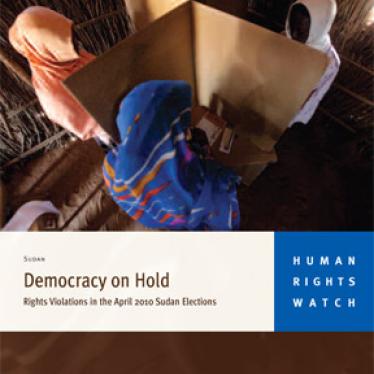The new UK government has made it clear that an important priority of its foreign policy will be to promote British trade and investment abroad. But recent remarks in Sudan by the Africa minister, Henry Bellingham, raise concerns that, by blindly pursuing commercial interests, the UK runs the risk of undermining international efforts to protect human rights and promote justice for serious abuses.
Trade is not only generally good for Britain. It can also benefit the UK's trading partners, because in the right circumstances trade stimulates wealth and economic development, which in turn can support another objective of UK foreign policy - poverty reduction. But trade with countries that are run by abusive and corrupt governments does not necessarily benefit the people of those countries. By consolidating the wealth and centralising the power of repressive leaders, trade can perpetuate and entrench the abuse and impunity that impede democratisation and development.
Sudan is a good example. Over the past 15 years, research by Human Rights Watch and others has shown how exploitation of Sudan's oil resources has fomented armed conflict and serious human rights abuses. In the late 1990s, an international outcry against abuses tied to the development of oil resources led to the withdrawal of Talisman Energy from a lucrative oil project in Sudan, and to the United States further extending a broad range of sanctions on Sudan.
Since then the ruling National Congress party has consolidated its domination of most industrial and commercial interests. Some of its development and industrial projects, such as the dam construction projects that led to forced displacements in northern Sudan, have clear human rights implications. There is little to indicate that Sudan's oil bonanza has been used for the benefit of Sudan's people.
Furthermore, the government has committed horrendous abuses against civilians in the course of its military operations against rebels in Darfur. In 2005 the United Nations security council - of which the UK is a permanent member - referred Sudan to the international criminal court (ICC) with the aim of achieving justice for the crimes committed in Darfur. But five years later the Sudanese government continues to thumb its nose at the court, which has issued an arrest warrant against the Sudanese president, a current governor in Sudan and a militia leader for atrocities committed in Darfur.
In 2007, the Bush administration broadened its sanctions against Sudan, and those sanctions remain in place. In contrast, during his visit to Sudan in July, Bellingham suggested that the UK was now looking to balance human rights concerns with a desire to increase business with Sudan.
"We feel the government of Sudan should co-operate with the court on the existing arrest warrants," Bellingham said. "But on the other hand we don't have an argument with the Sudanese people and it would quite perverse and wrong for us to not encourage trade because trade equals wealth."
Of course the UK should not seek to punish the Sudanese people simply because President Omar al-Bashir and others are wanted by the ICC. But is it right or sensible, even in the current straitened economic circumstances, for the UK to make a deliberate push to advance business ties with a country whose head of state is wanted for war crimes, crimes against humanity and genocide? Given the economic and political realities in Sudan, such an effort is more likely to line the pockets of leaders implicated in rights violations than to benefit ordinary people in Sudan.
The UK government needs to think carefully about the message it is sending to the Sudanese government. Bashir and his cronies will take a lot of comfort from the fact that the UK, hitherto one of the staunchest supporters of the ICC, is now calling for increased commercial ties with Sudan. Khartoum will be especially gratified because the UN security council has also failed to respond to a decision by ICC judges last May that Sudan is in clear violation of its obligation to co-operate with the court.
Britain should explain what kind of business it wants to pursue in Sudan and what kind of guarantees it has in place to ensure that increased trade there will not benefit war criminals. The UK should also spell out its plans to increase pressure on Sudan to co-operate with the ICC. Unless the UK can be clear on these points, it will be hard to avoid the conclusion that by pushing for greater trading ties with Sudan, the UK is tolerating, perhaps even rewarding, those who are evading justice for heinous crimes.
If the UK is seeking to boost its trading ties with Sudan, which country is next on its list? Zimbabwe? Burma? North Korea? Iran? They are looking for trade and investment, too.







